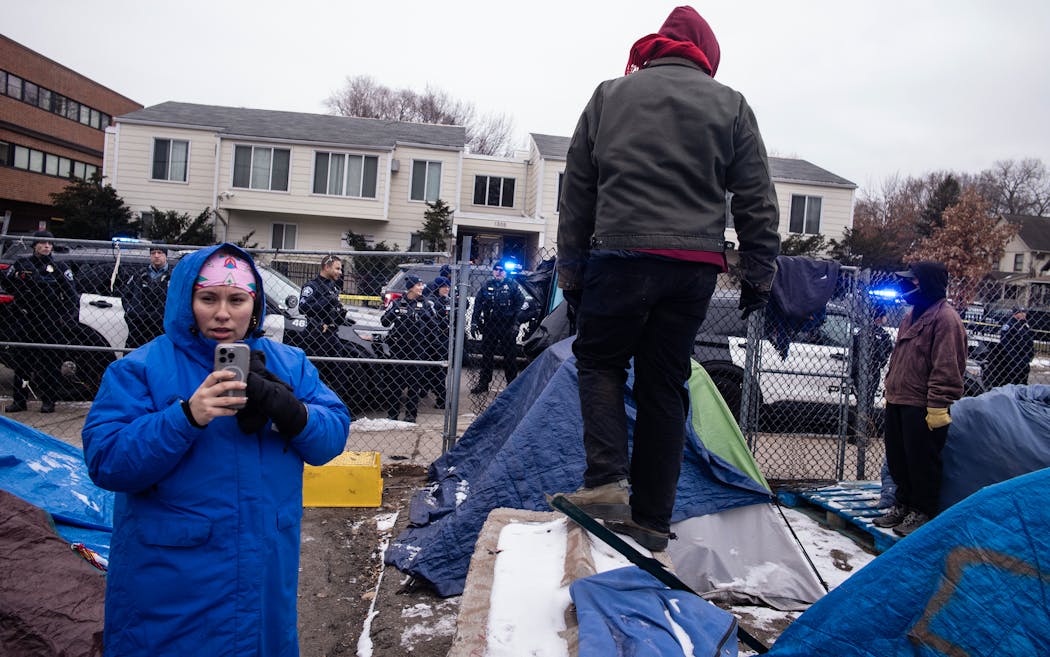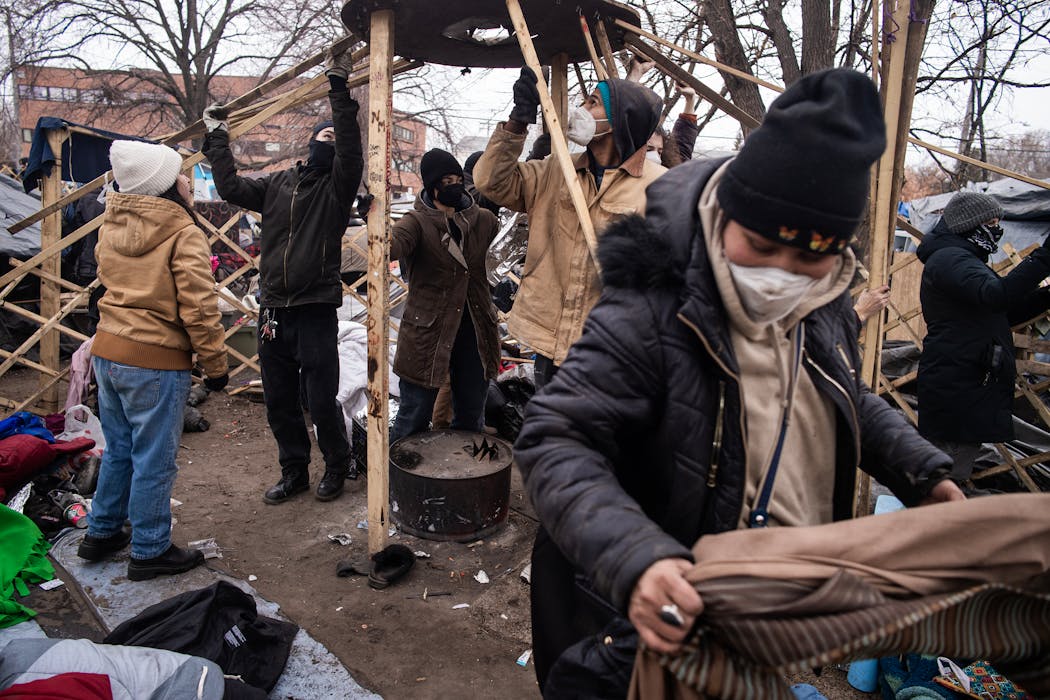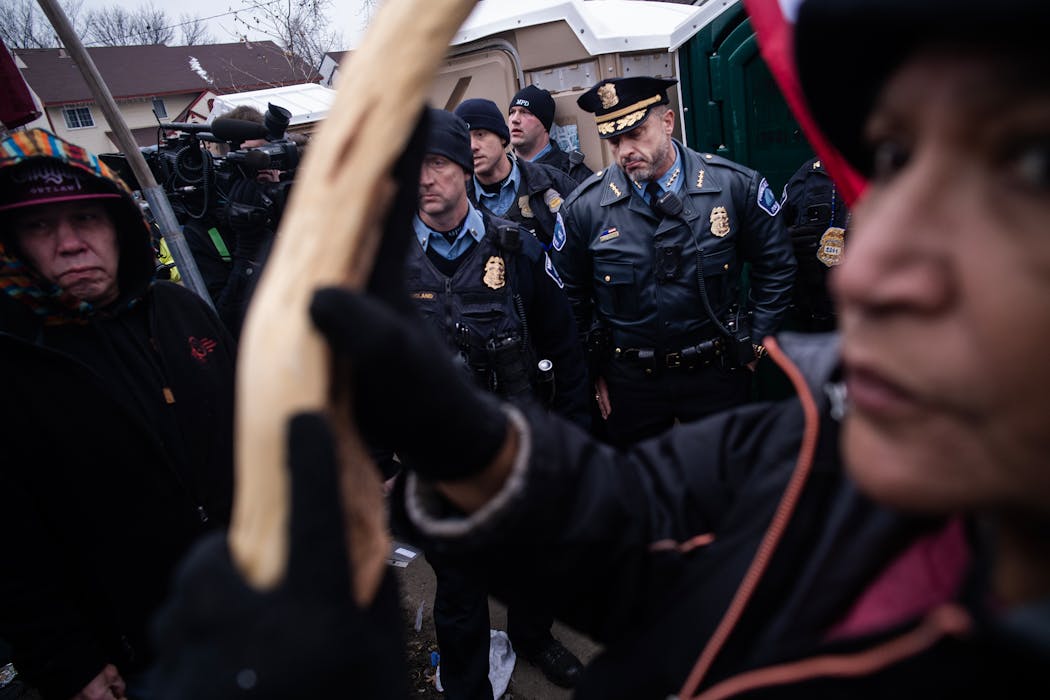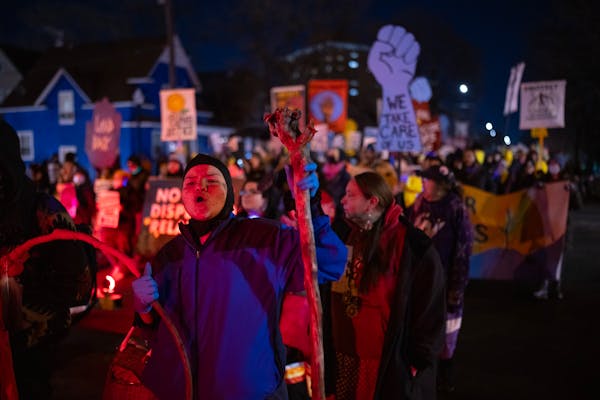The Native American leaders of Camp Nenookaasi, a large homeless encampment in south Minneapolis, held a final ceremony around their spirit fire Thursday morning as an army of volunteers dismantled the rugged yurts that had kept their occupants warm through the early winter.
Tarps were folded, personal belongings heaved in wheelbarrows. Everything went into a U-Haul to be lugged to another city-owned vacant lot at E. 26th Street and 14th Avenue S., just three blocks south, where the next iteration of the camp already sprawls beneath a red "Landback" banner. A mobile police camera surveilled from across the street while neighbors expressed hopelessness and alarm on social media over the city's never-ending migration of encampments.
"In Red Lake, we have a huge homelessness problem. We have the same opioid problems, and that's why our people continue to go back and forth and continue to be neglected," said Sam Strong, secretary of the Red Lake Nation. "It's important that we don't think of this as just Camp Nenookaasi, because it's all across the state."
After weeks of negotiations and two delays, the city of Minneapolis gave Nenookaasi residents until Thursday to move out, citing crime and imminent development plans for the land they occupied.
Filled with people who had been shuffled from one encampment to another — many of them having struggles with drug and alcohol dependency — Nenookaasi grew into Minneapolis' largest encampment in four months. It simultaneously became a hub for social service providers, who made contact with more than 100 chronically homeless people and helped dozens secure treatment and subsidized housing.
Camp leader Nicole Mason directed volunteers to look out for city vehicles. She insisted that no one shout antipolice obscenities or engage in violence.
Police arrived at 11:30 a.m., surrounding the camp and shutting down traffic. Police Chief Brian O'Hara, flanked by Inspector Jose Gomez and Assistant Chief Katie Blackwell, got out of their cars and assured Mason that her people would be given enough time to move out as long as they kept doing so. Camp organizers expressed their thanks.
Once the land at E. 23rd Street and 13th Avenue S. is vacated, the city will sell it to the neighboring nonprofit Indigenous People's Task Force, which plans to build an art and wellness center.
A different encampment, a different response
Camp Nenookaasi's operation — and its closure — differed in some ways from other encampments.
Unlike the vast majority of camps that have sprung up in recent years, Nenookaasi had dedicated leadership, providing a measure of supervision and orderliness. Mason is a recovery coach who had been homeless at Minneapolis' first major encampment, the Wall of Forgotten Natives, in 2018. While stressing the importance of sobriety, she acknowledged that not everyone sheltering at Nenookaasi was ready for treatment. Camp residents included people who got housing assistance but returned after relapse, and active drug users who couldn't go to sober shelters. Those who used opioids at Nenookaasi said it was safer to do so among peers trained in the lifesaving medicine naloxone.
Still, there was a fatal overdose and a fatal shooting. There were more than 100 emergency calls for drug use, sex acts, theft, vandalism and unresponsive people in and around the camp. A number of neighboring American Indian nonprofit organizations urged the city to close it.
After repeated requests from organizers and City Council members, officials provided the camp with portable toilets — something they had opposed in the past for fear of enabling unsanctioned camping. Also unlike its approach to many other camps, the city gave Nenookaasi notice of its closure date and delayed it twice so two emergency shelters could set up additional beds.
Law enforcement showed up Thursday well after 10 a.m., when the county's shelter reservation hotline begins to take calls. In the past, the city sometimes swept camps by surprise before 10, destroying property and stranding displaced people on the street.
By noon, the county's Adult Shelter Connect reservation system had just one regular bed left. But because Salvation Army and the seasonal shelter Rescue Now Services each set up 40 overflow beds this week, there were 58 mattresses still available.
Using nearly $1 million of opioid settlement funds, Minneapolis contracted Helix Health and Housing Services for outreach with camp residents — a role typically left to the county. Helix did not respond to repeated requests for interviews regarding its work or where it's housing people.
City spokeswoman Sarah McKenzie said the city also explored moving the remaining residents to a 24/7 indoor facility. Four "experienced and trusted service providers" were asked to manage it, but each declined, saying they lacked the capacity, McKenzie said.
Agate Housing Executive Director Kyle Hanson said he attended a Dec. 14 meeting with government officials. The service providers in attendance felt it would be practically impossible to stand up a facility for 150 people in the five days before the camp was then scheduled to be closed — Dec. 19. No physical location, scope of work or contract amount was ever proposed.
"This is a tough one because it's so many people, and because the leadership of this camp ... has been having some success with their community, housing some people, successfully working on sobriety, keeping an eye on everybody and making sure they're still alive in the morning," Hanson said.
Avivo, a housing provider which was also asked to help, called the eviction "inhumane and ineffective" in a statement.
"We appreciated the increased communication from the City of Minneapolis although we do not support their ultimate decision to evict Camp Nenookaasi residents today," said Latasha Jennings, project manager at the nonprofit Let Everyone Advance with Dignity, which does housing and legal advocacy out of the nearby Waite House food shelf. "The current practice of encampment closures disrupts our ability to provide consistent services to camp residents."
McKenzie said the site of the new encampment is slated for an affordable housing development.
Records show in 2021 the city authorized the sale of its properties at 2601 and 2695 14th Av. S. to Keyf Abdi to develop into a mixed-income fourplex, but the parcels were never sold.

Want to share info with the Star Tribune? How to do it securely

'Safe recovery sites' would offer syringes, naloxone and more to people using drugs. The plan could be in peril.
New Minnesota GOP leaders seek peace with party's anti-establishment wing

Who is Republican Lisa Demuth, Minnesota's first House speaker of color?





